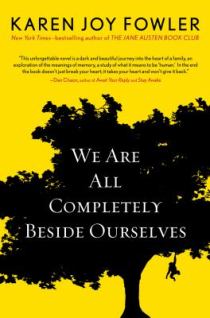 Fowler, Karen Joy. We Are All Completely Beside Ourselves. New York: G.P. Putnam’s Sons, 2013.
Fowler, Karen Joy. We Are All Completely Beside Ourselves. New York: G.P. Putnam’s Sons, 2013.
:-)! :-)! :-)! :-)!
I went into this book skeptically, because a couple of people I know had read it and hadn’t liked it. Maybe I wouldn’t have liked it as much as I did if I’d picked it up thinking it was going to be great, but it’s a fascinating read (at least for someone like me who was raised in an academic family and was surrounded by academics during her formative years, studied psychology, and likes surprises), so I’m pretty sure I would have wound up liking it as much as I did no matter what. I speak of surprises because there’s a plot twist that was discussed in early reviews and ad copy. Luckily, I didn’t read those reviews until I’d finished the book, and the publisher wised up when they came out with the edition I read, taking that spoiler out of the cover copy, so it wasn’t given away before I even opened the book. Even though I knew from having listened to others who’d read it (they’d basically said, “I can’t talk about this book with you until you’ve read it, because I’d have to give something away”) to keep an eye out for something I wasn’t expecting, I was still completely surprised when I found out what it was. I’m sure there were hints, but I didn’t pick up on them. It’s probably best if you don’t know what that twist is from the get-go, but it might be interesting to read it knowing it as well (kind of like knowing what’s going to happen at the end of Sixth Sense and searching for the clues).
Psychology is a field well-known for conducting some historic experiments that would be considered unethical today. Imagine, for instance, being a subject (or is “victim” a better word?) who is asked to send someone an increasingly more powerful electric shock every time he or she answers a question wrong. Or conditioning a baby to be afraid of anything white and fluffy. This story of an academic family examines what happens when experiments are conducted without considering what the future consequences might be — on all those involved in the experiment. The story is told through the eyes of Rosemary, the youngest child in the family, and the only child communicating with her parents when the book opens. She’s in college and is struggling, trying to piece together all her family’s secrets.
At first, I thought Rosemary was going to be an unsympathetic character, because she seems to be no more than an attention-seeking weirdo who wants the reader to know she’s different from everyone else. Soon enough, though, as the reader tries to help her piece together her story, she becomes very sympathetic, even more so once her story is revealed. In fact, this book isn’t always an easy read, so much is the reader encouraged to sympathize with Rosemary and her brother Lowell (who’s still in Rosemary’s life, a bit), as well as her sister Fern (who isn’t). Another surprise is how much, ultimately, the reader is encouraged to sympathize with Fern.
On the surface, the book is about one thing, but dig a little deeper, and it’s really yet another novel about family and love — what it means to be part of a family, how family members misunderstand and hurt each other, how they long for each other, and how they often do more damage than good through the best of intentions, thinking they’re protecting each other when they’re not. Rosemary is kept in the dark by her parents for two reasons: a. they don’t think she can handle what happened to Fern and b. they can’t handle it and want to convince themselves that everything is fine. Their guilt and deception does more harm, both to themselves (Rosemary’s mother suffers from clinical depression) and to Rosemary, than one imagines honesty would have.
Ultimately, despite its rather odd definition of “family” (for lack of a better term), this book is a spot-on account of human frailty and our own changing definitions of what, exactly, makes us human. For that, I loved it, and I hope, despite being so elusive (or maybe because of that), I’ve managed to encourage you to pick it up and see what you think.

Leave a comment
Comments feed for this article